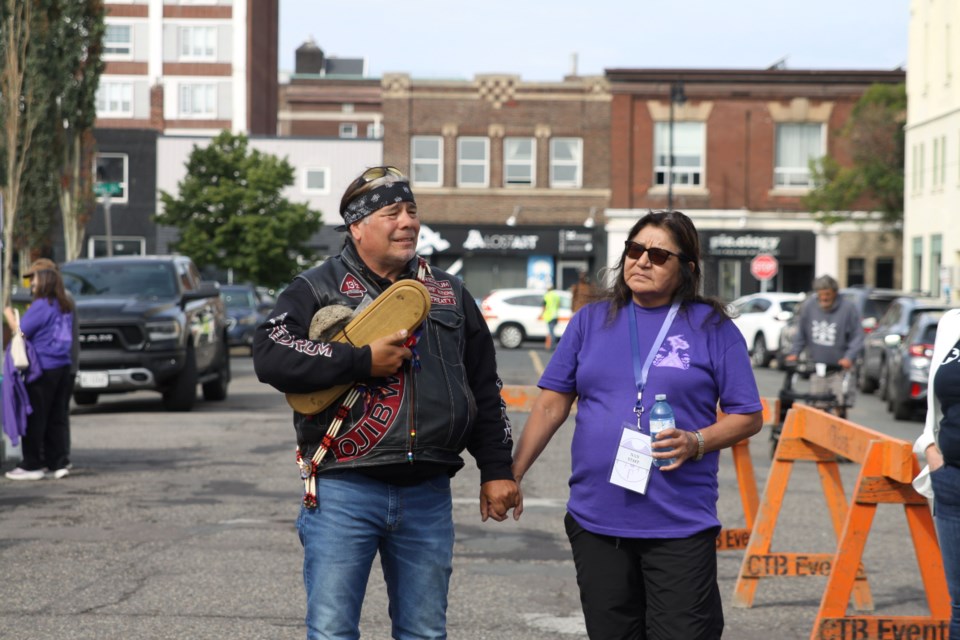THUNDER BAY — A flood of purple made its way to the city’s south end, raising awareness around addiction and overdose deaths on Wednesday.
On Wednesday, the Thunder Bay Drug Strategy and Thunder Bay District Health Unit held this year’s annual walk with the theme, "One Big Family, Driven by Hope."
“Every day means something when you lose a child, especially to an overdose that probably should have never happened,” said Fay Pettypiece, who was walking for her own daughter.
“If you ever go and listen to their story, they're the nicest (most) beautiful people you (would) want to meet, and they're someone's child at the end of the day,” Pettypiece said.
Calling on the provincial and federal governments to take action during this epidemic is the starting point, she said.
“I see more people dying from this, and it's not stopping so I think Thunder Bay as a city has to step up as a whole, and we have to help those people that need it,” Pettypiece said.
“Putting them in jail doesn't solve the problem,” she said. “We have to get the trauma-related resources and get them the help so that they can deal with it she said.
With the highest opioid mortality rates in the province for 2024, Rilee Willianen, drug strategy specialist and encampment response plan lead for the City of Thunder Bay, said the programs are needed more than ever.
“It's five times higher than the provincial average, and year over year it tends to be somewhere near the top along with other northern communities, so we know our community is really deeply impacted. And that's why it's so important to hold days like today,” Willianen said.
Providing annual events dedicated to helping vulnerable community members who struggle with addiction is the gateway to helping, she said.
“One of the key tenets of prevention is education, so we have lots of service providers here who are able to connect in the moment,” Willianen said.
Some local organizations connecting with residents at the annual event were Planet Youth, Matawa Health Co-operative, and the Children’s Centre Thunder Bay, each offering unique services and programs.
The annual walk illustrated how communities are interconnected, and although the pain of loss is shared, so too is the power to change what comes next, said the the health unit in a news release on Tuesday.
“They are a person,” said Anna Betty Achneepineskum, deputy grand chief of Nishnawbe Aski Nation.
“There's been high rates of individuals that are dying from overdoses. That's not only in this city but across this country,” she said. “The services and resources that are needed to address this are not there.”
Holding events like this is important for raising awareness, she said.
“We need to also be in other forms, whether we're meeting with pharmaceutical companies, physicians and other medical professionals, including… mental health,” she said.
“We need to have these conversations with child welfare agencies and other entities that can all be part of the solution in terms of addressing this issue, and we need to ensure that we have the resources there for prevention.”
Remembering people who have been lost to overdoses is vital, she said.
“We must also have these events as well to remember those individuals that have left us, and the children,” she said. “We need to ensure that we have services and resources for grieving families as well.”
Currently, city residents have a variety of local supports and services that help reduce the risks associated with substance use, such as:
- Naloxone
- Drug checking services
- Outreach harm reduction services and supplies
- The Lifeguard Connect app
- Rapid access to addiction medical clinics, and
- Withdrawal management services
For more information about naloxone, contact Thunder Bay District Health Unit’s Harm Reduction Team, Superior Points at: 807-621-7861. Naloxone is also available at many pharmacies in Thunder Bay.
For more information about withdrawal management services, the Balmoral Centre is available at 807-623-6515.
Residents can also dial 211 to get connected with a Rapid Access Addictions Medicine Clinic and other substance use health services.
